 Petzlover
Petzlover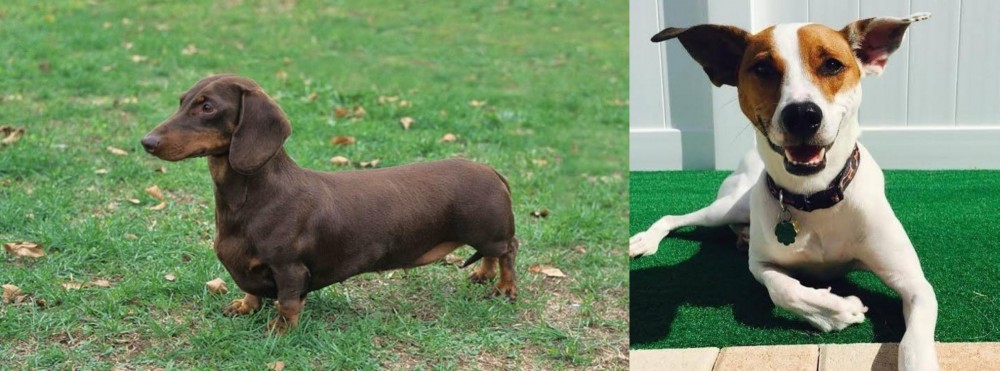 Dachshund is originated from Germany but Feist is originated from United States. Dachshund may grow 28 cm / 11 inches shorter than Feist. Both Dachshund and Feist are of same weight. Dachshund may live 3 years less than Feist. Dachshund may have more litter size than Feist. Both Dachshund and Feist requires Low Maintenance.
Dachshund is originated from Germany but Feist is originated from United States. Dachshund may grow 28 cm / 11 inches shorter than Feist. Both Dachshund and Feist are of same weight. Dachshund may live 3 years less than Feist. Dachshund may have more litter size than Feist. Both Dachshund and Feist requires Low Maintenance.
 The Dachshund originated in Germany. He was used as a hunting dog with his origins starting way back in the 15th century already. The small dog was developed to hunt for animals that buried themselves deep underground such as badgers. The shape of the dog and his courage and bravery allowed him to take on the badger.
The Dachshund originated in Germany. He was used as a hunting dog with his origins starting way back in the 15th century already. The small dog was developed to hunt for animals that buried themselves deep underground such as badgers. The shape of the dog and his courage and bravery allowed him to take on the badger.
There has been a lot of debate as to whether the Dachshund is a hound or terrier, and it was decided that the Dachshund is a hound that became a terrier, and which displays some of the best qualities of both.
It was in 1881 that the Dachshund Club of England was formed and the German Deutscher Teckelklub was formed in 1888. The small dog gained popularity in America and the Dachshund Club of America was founded in 1895.
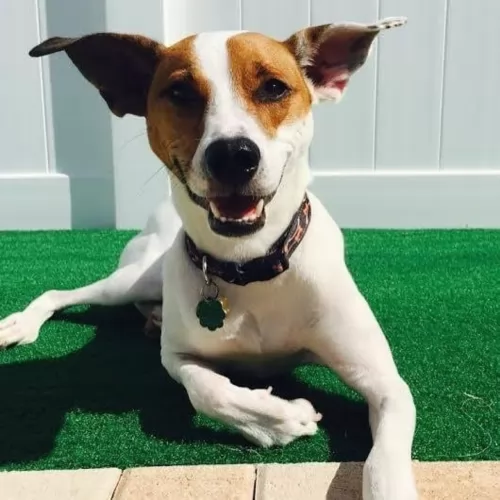 The Feist is a small dog from the United States, coming from Terrier dogs which were brought over to the States. It is believed that these Terriers included crosses between several terriers – the Manchester Terriers, Smooth Fox Terrier and English White Terrier – dogs used as ratters and known for their skills in killing rats.
The Feist is a small dog from the United States, coming from Terrier dogs which were brought over to the States. It is believed that these Terriers included crosses between several terriers – the Manchester Terriers, Smooth Fox Terrier and English White Terrier – dogs used as ratters and known for their skills in killing rats.
The Feist isn’t a new type of dog and in fact there are records of the dog which go back centuries. George Washington even referred to them in 1770 already, and the breed was popularized by President Teddy Roosevelt, who hunted with his Feist.
 Known as Badger Dogs, Sausage Dogs or Doxies, the Dachshund is known for his long body, his sharp, pointed face and the short legs with the large front paws.
Known as Badger Dogs, Sausage Dogs or Doxies, the Dachshund is known for his long body, his sharp, pointed face and the short legs with the large front paws.
He stands at about 21-28 cm while the female may be 20-25 cm and weighing 6 to 15kg. He is the smallest of the hound dogs, with the standard size dachshund being developed to scent and chase badgers and other animals.
There are different Dachshund coat varieties – the smooth coat, the long-haired Dachshund and the wire-haired dachshund. They also come in a number of solid colors such as brown, red, tan, chocolate and black.
The dachshund is an energetic,social little dog with a loving personality. He’ll love to lie as close as possible to you on the couch and be with you wherever you are. Training and socialization is important so he doesn’t become too protective so that he wants to go for anyone who comes near.
He can be stubborn but he is also protective of his human family. Dachshunds are known for their tendency to bark but training and socialization can help tremendously to make him obedient and relaxed around humans and pets.
He is small enough to be a great pet in the city or in the country. He loves to spend time indoors- as well as outdoors. He can become a loving companion and gets on well with children and pets in the house. In spite of his small size, he makes a good watchdog.
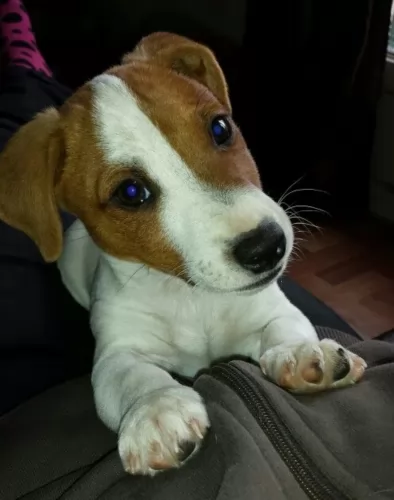 Standing at about 46cm to 56cm in height and weighing in the region of 10 to 15kg, the Feist is a short haired dog that doesn’t shed much and he is not hypoallergenic.
Standing at about 46cm to 56cm in height and weighing in the region of 10 to 15kg, the Feist is a short haired dog that doesn’t shed much and he is not hypoallergenic.
The coat of the dog is available in a variety of colors but they are essentially a bi-colored dog such as red and white, tan and white, black and white, while solid colors are fawn, white, light brown, black and brindle too.
Perhaps because of so many genes being involved with this dog, it is more easily identified because of its hunting abilities. He is a sturdy dog with a medium length tail which he holds up. Some Feist owners prefer the look of a docked tail and then docking is between the second and third joint of the tail. The Feist has erect or semi-erect ears.
Intelligent and alert, the Feist is a dog that will respond well to training. As with any other dog, training and socialization will be important for him so that he is obedient. He is energetic, curious and alert and above all he wants the attention of his human family.
 The Dachshund may be small but he is courageous, brave and loyal. He gets on well with children and pets in the home but care needs to be taken because of his long back.These dogs are prone to disk problems so you have to be careful with rough and tumble from children.
The Dachshund may be small but he is courageous, brave and loyal. He gets on well with children and pets in the home but care needs to be taken because of his long back.These dogs are prone to disk problems so you have to be careful with rough and tumble from children.
Dog experts say that the different kinds of Dachshunds produce different personalities and that the longer-coated one is more amicable than the short-coat variety. Whichever variety you choose, they are guaranteed to entertain and delight you and be a loyal, loving companion.
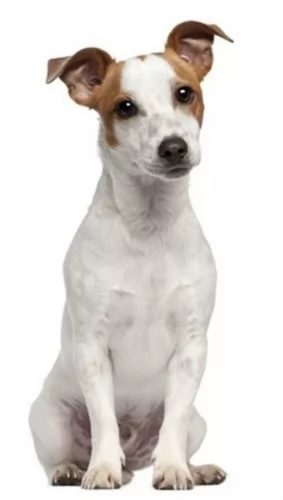 Loving to be around his human family and being a devoted and loyal canine friend, the Feist is also an intelligent, energetic dog who is fairly easy to train.
Loving to be around his human family and being a devoted and loyal canine friend, the Feist is also an intelligent, energetic dog who is fairly easy to train.
Bright and alert he makes a good watchdog too, but is amicable enough to get on well with other pets in the home as well as with children.
He can be stubborn so training and socialization will be important for him. As it is, he likes a firm, strong owner and in exchange for good care, he will become your devoted, loyal friend.
 The life expectancy of the Dachshund is 12 to 16 years. With good care which includes good nutrition he can reach mature years. However there are always some dog diseases that are worth knowing about so that you can steer your pet away from them.
The life expectancy of the Dachshund is 12 to 16 years. With good care which includes good nutrition he can reach mature years. However there are always some dog diseases that are worth knowing about so that you can steer your pet away from them.
One of these is obesity, and the Dachshund is prone to developing obesity. Never overfeed him and ensure he gets his regular exercise which can be walks and ball games. Check with your vet if you’re unsure about how to feed him. Essentially, the amount of food you give a dog depends on the size of your dog, his age and his activity levels.
Be sure to provide high-quality food and monitor his intake. Your vet is always there to advise on the correct food and amount that can help him remain healthy.
Unfortunately, this dog’s shape – the long back – makes the dog more prone to disc herniation. With some Dachshunds having a gene that creates mineral deposits in the discs in the spine, the risk of herniation is higher.
A large percentage of dachshunds have intervertebral disc disease. Encourage your Dachshund not to jump down off a bed or couch, but rather provide some steps for him to get to out of reach places.
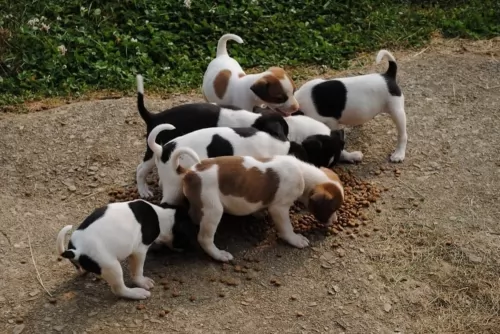 A Feist is a robust dog who doesn’t have any particular health issues, and with good care he can reach 18 years of age if looked after well. Hip Dysplasia is such a common dog illness that it always bears mentioning.
A Feist is a robust dog who doesn’t have any particular health issues, and with good care he can reach 18 years of age if looked after well. Hip Dysplasia is such a common dog illness that it always bears mentioning.
This is a ball and socket joint problem where the joint doesn’t function smoothly and the grinding of the bone leads to pain and arthritis for your pet. You'll notice he battles to play games anymore and he also battles to get up after lying down. You need to know that this disease isn’t reserved for old dogs but can start while your dog is still a puppy and that it can lead to lameness.
Look out for allergies in your dog as they can cause a host of problems which can include his skin, his breathing and problems with digestion. Typical symptoms of a dog with allergies include sneezing,scratching and very distressing for a dog, itchy and red skin which can eventually ooze.
As a responsible dog owner it is imperative when you detect problems with your dog, to get him to the vet immediately.
 The Dachshund is a medium shedder and if you choose the short haired dog, you’re going to have a low maintenance pet.
The Dachshund is a medium shedder and if you choose the short haired dog, you’re going to have a low maintenance pet.
The long haired Dachshund will require more regular brushing but the short-haired Dachshund is a low maintenance dog that will require a brush once a week.
While brushing him, you can be checking his ears and nails at the same time. All dogs with floppy ears need to have them checked for ear infections. Also, maintain good oral hygiene with your Dachshund by brushing his teeth 2 or 3 times a week.
 Grooming your Feist dog isn’t going to be costly or difficult at all, as with his short, smooth coat he will essentially only require a brush twice a week.
Grooming your Feist dog isn’t going to be costly or difficult at all, as with his short, smooth coat he will essentially only require a brush twice a week.
It’s good to get into the habit of brushing him as not only does it keep his coat sleek and shiny, he loves you paying him attention.
All dog owners need to know that grooming goes beyond just brushing the coat. You want to also check his nails that they are short, check in and around his ears and brush his teeth with special dog toothpaste and toothbrush.
Give your Feist the very best dog food there is. Home-made is always good but if you feed him commercially manufactured food, make sure its a quality one. Some raw meat added in every now and again is important for his health. Ensure fresh, cool water is available to him around the clock.
Your Feist is an energetic dog that has been accustomed to hunting and running down small prey. He is an outdoor dog, thriving on fun and games. Take him on your walks, your hikes or when you go cycling or swimming. He wants to be right there with you involved in everything. While he can slot into life in the city or the countryside, he isn’t an indoor dog and it certainly won’t be good for him if you keep him cooped up in a tiny garden and pretty much forget about him.